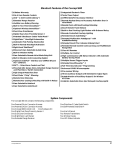Download Directed Electronics Intelliguard 950 Programming instructions
Transcript
Intelliguard 950
Owner’s Guide
limited lifetime consumer warranty
Directed Electronics, Inc. ("Directed") promises to the original purchaser to repair or replace
with a comparable reconditioned model any Directed unit (hereafter the "unit"), excluding
without limitation the siren, the remote transmitters, the associated sensors and accessories,
which proves to be defective in workmanship or material under reasonable use during the lifetime of the vehicle provided the following conditions are met: the unit was professionally
installed and serviced by an authorised Directed dealer; the unit will be professionally reinstalled in the vehicle in which it was originally installed by an authorised Directed dealer; and
the unit is returned to Directed, shipping prepaid with a legible copy of the bill of sale or other
dated proof of purchase bearing the following information: consumer's name, telephone number and address; the authorised dealers name, telephone number and address; complete product description, including accessories; the year, make and model of the vehicle; vehicle registration number and vehicle identification number. All components other than the unit, including without limitation the siren, the remote transmitters and the associated sensors and accessories, carry a one-year warranty from the date of purchase of the same. This warranty is nontransferable and is automatically void if: the unit's date code or serial number is defaced, missing or altered; the unit has been modified or used in a manner contrary to its intended purpose; the unit has been damaged by accident, unreasonable use, neglect, improper service,
installation or other causes not arising out of defects in materials or construction. The warranty does not cover damage to the unit caused by installation or removal of the unit. Directed, in
its sole discretion, will determine what constitutes excessive damage and may refuse the return
of any unit with excessive damage. TO THE MAXIMUM EXTENT ALLOWED BY LAW, ALL WARRANTIES, INCLUDING BUT NOT LIMITED TO EXPRESS WARRANTY, IMPLIED WARRANTY, WARRANTY OF MERCHANTABILITY, FITNESS FOR PARTICULAR PURPOSE AND WARRANTY OF NONINFRINGEMENT OF INTELLECTUAL PROPERTY, ARE EXPRESSLY EXCLUDED; AND DIRECTED NEITHER ASSUMES NOR AUTHORISES ANY PERSON OR ENTITY TO ASSUME FOR IT ANY DUTY,
OBLIGATION OR LIABILITY IN CONNECTION WITH ITS PRODUCTS. DIRECTED DISCLAIMS AND
HAS ABSOLUTELY NO LIABILITY FOR ANY AND ALL ACTS OF THIRD PARTIES INCLUDING ITS
AUTHORISED DEALERS OR INSTALLERS. DIRECTED SECURITY SYSTEMS, INCLUDING THIS UNIT,
ARE DETERRENTS AGAINST POSSIBLE THEFT. DIRECTED IS NOT OFFERING A GUARANTEE OR
INSURANCE AGAINST VANDALISM, DAMAGE OR THEFT OF THE AUTOMOBILE, ITS PARTS OR
CONTENTS; AND HEREBY EXPRESSLY DISCLAIMS ANY LIABILITY WHATSOEVER, INCLUDING
WITHOUT LIMITATION, LIABILITY FOR THEFT, DAMAGE AND/OR VANDALISM. THIS WARRANTY DOES NOT COVER LABOUR COSTS FOR MAINTENANCE, REMOVAL OR REINSTALLATION OF
THE UNIT OR ANY CONSEQUENTIAL DAMAGES OF ANY KIND. IN THE EVENT OF A CLAIM OR
A DISPUTE INVOLVING DIRECTED OR ITS SUBSIDIARY, THE PROPER VENUE SHALL BE SAN
DIEGO COUNTY IN THE STATE OF CALIFORNIA. CALIFORNIA STATE LAWS AND APPLICABLE
FEDERAL LAWS SHALL APPLY AND GOVERN THE DISPUTE. THE MAXIMUM RECOVERY UNDER
ANY CLAIM AGAINST DIRECTED SHALL BE STRICTLY LIMITED TO THE AUTHORISED DIRECTED
DEALER'S PURCHASE PRICE OF THE UNIT. DIRECTED SHALL NOT BE RESPONSIBLE FOR ANY
DAMAGES WHATSOEVER, INCLUDING BUT NOT LIMITED TO, ANY CONSEQUENTIAL DAMAGES, INCIDENTAL DAMAGES, DAMAGES FOR THE LOSS OF TIME, LOSS OF EARNINGS, COMMERCIAL LOSS, LOSS OF ECONOMIC OPPORTUNITY AND THE LIKE. NOTWITHSTANDING THE
ABOVE, THE MANUFACTURER DOES OFFER A LIMITED WARRANTY TO REPLACE OR REPAIR
© 2 0 0 4 d i re c t e d e l e c t ro n i c s , i n c .
i
THE CONTROL MODULE AS DESCRIBED ABOVE. Some states do not allow limitations on how
long an implied warranty will last or the exclusion or limitation of incidental or consequential
damages. This warranty gives you specific legal rights and you may also have other rights that
vary from State to State or Country to Country.
Make sure you have all of the following information from your dealer:
A clear copy of the sales receipt and installation certificate, showing the following:
z
Date of purchase
z
Your full name and address
z
Authorised dealer's company name and address
z
Type of alarm installed
z
Year, make, model and colour of the vehicle
z
Vehicle registration number
z
Vehicle identification number
z
All security options installed on the vehicle
trademarks and copyrights
Bitwriter®, Clifford®, Code-Hopping™, Directed®, Doubleguard®, ESP®, FailSafe®, Ghost Switch®,
Learn Routine™, Nite-Lite®, Nuisance Prevention®, NPC®, Revenger®, Silent Mode™, Soft Chirp®,
Stealth Coding™, Stinger®, Valet®, Vehicle Recovery System™, VRS™, and Warn Away® are all
Trademarks or Registered Trademarks of Directed Electronics, Inc.
ii
contents
limited lifetime consumer . . . . . . .
diagnostics . . . . . . . . . . . . . . . . . .16
warranty . . . . . . . . . . . . . . . . . . . . .i
arming diagnostics . . . . . . . . .16
what is included
. . . . . . . . . . . . .3
important information . . . . . . . . .3
system maintenance . . . . . . . .4
your warranty . . . . . . . . . . . . .4
transmitter configurations . . . . . .5
transmitter functions . . . . . . . . . .6
standard configuration for 5-but-
disarming diagnostics . . . . . . .17
arm/disarm diagnostic chart . .17
table of zones . . . . . . . . . . . .18
high frequency . . . . . . . . . . . . . .19
smart power up II . . . . . . . . . . . .19
power saver mode . . . . . . . . . . .19
programming options . . . . . . . .20
ton Radar2 transmitter . . . . . . .6
cliffnet wizard installation soft-
standard configuration for 4-but-
ware programming . . . . . . . .21
ton OEM Transmitter . . . . . . . .7
manual programming instruc-
using your system . . . . . . . . . . . . .9
arming . . . . . . . . . . . . . . . . . . .9
disarming . . . . . . . . . . . . . . . .10
disarming without a transmitter .
. . . . . . . . . . . . . . . . . . . . . . .11
remote siren silencing . . . . . .11
transmitter chirp muting . . . .11
transmitter sensor disable . . .12
tions . . . . . . . . . . . . . . . . . . .22
user selectable features . . . . .23
user selectable features descriptions - column one . . . . . . . . .24
user selectable features descriptions - column two . . . . . . . .25
user selectable features descriptions - column three . . . . . . .27
intellistart and smartwindows
pin programming . . . . . . . . . . . .29
sensor bypass . . . . . . . . . . . . .12
ultrasecure auto-immobiliser . . .30
auxiliary channel bypass . . . . .13
auto-immobilisation sequence 31
disarm/valet mode . . . . . . . . .13
one-time valet feature
. . . . .31
transmitter valet mode . . . . . .14
blackjax* feature . . . . . . . . . . . .32
one-time auto-arming bypass .15
blackjax activation sequence .32
low battery warning . . . . . . .15
blackjax* deactivation sequence
automatic noise abatement . .15
. . . . . . . . . . . . . . . . . . . . . . .34
multiple event total recall . . . .16
bypass blackjax temporarily . .34
© 2 0 0 4 d i re c t e d e l e c t ro n i c s , i n c .
1
blackjax* off warning indicator .
glossary of terms . . . . . . . . . . . . .36
. . . . . . . . . . . . . . . . . . . . . . .35
security & convenience expansions
system sensors and adjustments
. . . . . . . . . . . . . . . . . . . . . . .35
2
. . . . . . . . . . . . . . . . . . . . . . . . . . .38
health check . . . . . . . . . . . . . . . .39
what is included
z
Intelliguard 950 Security System
z
One 5-button transmitter and one 4-button transmitter
z
Presentation envelope and quick reference card
z
Two window decals
z
XHF antenna/receiver
z
Blue status LED
z
PlainView 2 Valet switch
z
515C Smart Self-powered siren
z
Tilt/Motion sensor
z
One of the following sensor options
Digital Dual-Zone proximity sensor
Ultrasonic sensor
Glass Tamper sensor
important information
Congratulations on the purchase of your state-of-the-art Thatcham
evaluated vehicle security system. It has been designed to provide years
of trouble-free operation. In order to maximise the use of this system,
please review this owner's guide carefully prior to using your system.
You can print additional or replacement copies of this owner’s guide by
accessing the Clifford website at www.clifford.com.
© 2 0 0 4 d i re c t e d e l e c t ro n i c s , i n c .
3
note: Your system MUST be installed by an Authorised dealer in accordance with the instructions we supply them. The Clifford Intelliguard
950 system is designed to be installed in any petrol or common rail
diesel vehicle with a 12-volt battery.
note: The Installation Certificate must be completed by your installer at
the authorised dealer. Other than the remote controls, this system has no
user-serviceable parts. Your authorised dealer can correct any system
wiring problems and, if needed, can return any malfunctioning component to Directed Electronics for repair/replacement under the terms of
the Limited Lifetime Warranty printed at the beginning of this guide.
note: Making changes to the existing system will invalidate the certificate of installation.
system maintenance
The Intelliguard 950 requires no specific maintenance. Your transmitter
is powered by a miniature 3V lithium battery that will last approximately one year under normal use. When the battery weakens, operating
range will be reduced and the system will provide a low battery warning chirp indication when disarming.
your warranty
It is necessary to retain your sales receipt, which reflects that the product was installed by an authorised dealer. For full details regarding your
warranty coverage, please refer to the consumer warranty section of
this guide.
4
transmitter configurations
Your Intelliguard 950 system has a 5-button and 4-button remote control. Your system can accept up to 2 additional remotes. Each remote
can be used to control the various standard features and options of
your system as shown in the following pages.
5-Button Transmitter
Remote Start or
Accessory Output
Button
Arm/Disarm Button
Silent Arm/Disarm or
Accessory Output
Button
Boot Release or
Optional Accessory
Output Button
Shift Button
4-Button Transmitter
Remote Start or
Accessory Output
Button
Accessory Output
Button
Arm/Disarm
Button
Boot Release or
Optional Accessory
Output Button
note: This manual describes the features and accessories that are
included with your system along with information about compatible
Clifford accessories that are not included. For a list of included accessories, please refer to the What Is Included section of this manual.
© 2 0 0 4 d i re c t e d e l e c t ro n i c s , i n c .
5
transmitter functions
This system uses computer-based code learning to learn the transmitter
buttons. This makes it possible to assign any transmitter button to any
system function. The transmitter initially comes programmed with standard configuration, but may also be customised using the CliffNet
Wizard PC program. The buttons in all of the instructions in this manual correspond to a standard configuration transmitter.
standard configuration for 5-button Radar2 transmitter
Button
The arming and disarming functions are controlled by this button.
Button
The boot release or accessory output A is controlled by this button.
Button
Silent arm and disarm is controlled by this button.
Button
Remote start is controlled by this button, if the Intellistart* accessory is
added.
Button, then
Button
Accessory B output is controlled by these buttons.
* This feature/accessory is not evaluated by Thatcham.
6
Button, then
Button
These buttons activate the optional SmartWindows.
Button, then
Button
Accessory C output is controlled by these buttons.
Button twice, then
Button
These buttons activate remote valet.
Button twice, then
Button
These buttons disable the sensors.
Button twice, then
Button
These buttons enter safe start mode for manual transmission vehicles
and activate Autostart mode. (Requires optional Intellistart* accessory.)
standard configuration for 4-button OEM Transmitter
Button
The arming and disarming functions are controlled by this button.
Button
The boot release or accessory output A is controlled by this button.
Button
Accessory output B is controlled by this button.
* This feature/accessory is not evaluated by Thatcham.
© 2 0 0 4 d i re c t e d e l e c t ro n i c s , i n c .
7
Button
Remote start is controlled by this button. (Requires optional Intellistart*
accessory.)
and
Buttons
Silent arm/disarm is controlled by these buttons.
and
Buttons
These buttons activate the optional SmartWindows.
and
Buttons
These buttons activate remote valet.
and
Buttons
These buttons activate Accessory output C.
and
Buttons
These buttons disable the sensors.
and
Buttons
These buttons enter safe start mode for manual transmission vehicles
and activate Autostart mode. (Requires optional Intellistart* accessory.)
* This feature/accessory is not evaluated by Thatcham.
8
using your system
The buttons used in the instructions in this manual correspond to the
standard transmitter configuration. If your transmitter has been custom
configured, the icons on your transmitter buttons may not correspond
to the indicated functions.
arming
You can activate, or arm, the system by pressing
on your trans-
mitter for one second. When the system arms, you will hear two short
siren sounds, or chirps, and see the indicator lights flash twice. The LED
will begin to flash steadily. If the vehicle’s existing central locking has
been connected to the system, the doors will lock.
While the system is armed, the LED status indicator will flash approximately once per second showing that the system is actively protecting
your vehicle. If you hear more than two chirps when arming, refer to
the Diagnostics section of this guide. These extra chirps confirm a malfunction autobypass.
The security system also can be programmed to arm itself
automatically (called passive arming). If the system is programmed for
passive arming, it will automatically arm 30 seconds after the ignition
is turned off and the system sees you leave the vehicle by opening and
closing a door. Whenever the system is in its 30-second passive-arming
countdown the siren will chirp twice and the lights will flash twice five
seconds after the last door has been closed. The system is not actually
armed at that point. The system arms and the doors lock (if connected
and programmed for passive locking) at 30 seconds, but the siren will
© 2 0 0 4 d i re c t e d e l e c t ro n i c s , i n c .
9
not chirp. The early chirps provide you with a 25-second warning prior
to arming.
note: If any protected entry point (a door or a switch-protected boot or
bonnet) is open, the system will not passively arm. Additionally, each
time a protected entry is triggered during the arming countdown, the
30-second countdown starts from the beginning.
When armed, your vehicle is protected as follows:
z
The LED will flash as a visible theft deterrent.
z
The Ultrasecure Immobilisation circuits prevent the vehicle
from being started.
z
Installed sensors if tripped will trigger the system. The triggered sequence is 30 seconds of constant siren sounding
and flashing indicator lights.
z
If a protected entry (door, boot, or bonnet) is opened, the
system will immediately trigger the siren and flash the indicator lights.
z
The tilt/motion sensor will protect the vehicle from being
raised in an attempt to either remove the wheels/tires or tow
the vehicle.
disarming
To disarm the system, press
. You will hear a chirp and the indicator lights will flash once. If the vehicles central locking is connected to the
system, the doors will unlock. If the siren chirps three times when disarming, refer to the Diagnostics section of this guide. This is called
Tamper Alert. If the siren is sounding when the system is disarmed you
will hear two chirps but the system is not disarmed. (Refer to the Remote
Siren Silencing section of this guide.) However, if the alarm completes the
full trigger cycle when disarmed you will hear three chirps.
10
disarming without a transmitter
This feature allows you to disarm the system without the transmitter
should it be lost, damaged, or disabled. In order to disarm without a
transmitter, you must have the vehicle’s ignition key, know where the
PlainView 2 Valet switch is located, and have the PIN code. Be sure to
check with the installer for the location of the PlainView 2 Valet switch.
Please refer to the Disarm/Valet Mode section of this guide for instructions to enter the pin code.
remote siren silencing
This system offers remote siren silencing. Remote siren silencing is a feature that makes it possible to silence and reset the system when it is
triggering without disarming the system. If the system is triggered and
the siren has been sounding, press
on the transmitter to stop the
trigger and return the unit to the armed state. The system will not disarm, but rather reset. This prevents you from disabling the system
should you wish to silence it without visually checking the vehicle. After
resetting the system, press
again to disarm the system.
transmitter chirp muting
To arm or disarm your system without siren chirps, simply press
on the transmitter, and the confirmation chirp(s) will be eliminated for
that one operation only. The indicator lights will flash to confirm the
arm/disarm command. If you want the arm/disarm chirps turned off
permanently, please refer to the User-Selectable Features section of this
guide.
© 2 0 0 4 d i re c t e d e l e c t ro n i c s , i n c .
11
transmitter sensor disable
To temporarily disable a sensor input, arm the system, press
twice and then
. The lights will flash four times and
all warn away trigger zones one, two, three, and eight are bypassed.
Press the buttons again; the lights flash four times and both warn away
and full trigger zones one, two, three, and eight are bypassed until the
system is disarmed. This can be performed anytime the system is armed.
1.
Arm the system.
2.
Press
3.
The lights will flash four times; all warn away zones are now
bypassed.
4.
Transmit the sensor bypass channel again. (Press
twice and then
.)
5.
The lights will flash four more times; the sensor warn away
and full trigger zones are now bypassed.
6.
The sensor zones will reset when disarmed.
twice and then
.
intellistart and smartwindows sensor bypass
When the system sees a command to start the vehicle via the
Intellistart, it bypasses sensor zones and will continue to bypass these
zones until the remote start shuts down.
When the system sees a SmartWindows command for up or down
operation, the unit will automatically bypass sensor zones one, two,
three, and eight until the windows complete their operation.
12
auxiliary channel bypass
Alarm sensor input zones one, two, three, and eight will be bypassed
while a pulsed or timed auxiliary Output is active.
disarm/valet mode
Entering your pin code using the PlainView 2 Valet switch allows you
to disarm the system or enter valet mode without using the transmitter. In valet mode, the security system will not arm, even with the transmitter, but all convenience functions (door locks, boot release, etc.) will
continue to work normally.
To disarm or enter Valet Mode:
1. Turn the ignition on.
2. Enter PIN code (the factory setting is written on
the back of this manual). Your pin code has 4
digits. To enter a digit, you press and release
the
button of the plainview 2 switch the
number of times of the digit to be entered, followed by pressing the unmarked
button. To
enter a zero, you simple press and release the
unmarked
button.
EXAMPLE: To enter a code of 1203, you would press and release the
plainview switch as follows:
–
,
–
© 2 0 0 4 d i re c t e d e l e c t ro n i c s , i n c .
–
,
,
–
–
–
13
3. After the last digit of the pin code is entered:
a. To disarm the system: press and release
b. To enter valet mode: Press and hold
.
for
three seconds.
The LED status indicator will illuminate continuously if you are entering
Valet Mode and will turn off if you are exiting Valet Mode.
To exit Valet Mode:
1. Turn the ignition on. The system will then automatically exit Valet mode.
transmitter valet mode
The operations described in this section refer to transmitter buttons.
Remember, the buttons used in all the instructions in this guide correspond to a Standard Configuration transmitter. This may not be how
your transmitter is set up.
To enter Valet Mode, press
twice and then
. The
LED status indicator will illuminate continuously if you are entering
Valet Mode, or will turn off if you are exiting Valet Mode.
14
one-time auto-arming bypass
This will bypass the auto arm feature once only.
1.
With the key, turn the ignition on, then off within two seconds.
2.
The siren will chirp once to confirm auto arming bypass.
3.
The system will not auto arm.
note: The system will revert to normal auto arming when the system
sees the ignition on for at least three seconds.
During auto arming bypass the system will not roll up the windows if
SmartWindows is connected, and the accessory output will not autoactivate when using the remote to arm the system.
low battery warning
When the transmitter battery is low, the siren will generate a lowpitched tone when the alarm is disarmed.
automatic noise abatement
Alarm sounding is limited to ten 30-second siren duration cycles to
meet European criteria and local noise pollution laws.
© 2 0 0 4 d i re c t e d e l e c t ro n i c s , i n c .
15
multiple event total recall
This will report the last eight system triggers.
1.
Press and hold
of the PlainView 2 Valet switch.
2.
While still holding
release the button.
3.
The LED will start to blink to indicate the most recent trigger
and proceed down to the eighth trigger. If fewer than eight
triggers are stored in memory, the LED will flash continuously until the system is armed/disarmed using the transmitter
or the ignition is turned on. For more information, please
refer to the Table of Zones section of this guide.
, arm and disarm the system, then
diagnostics
The microprocessor at the heart of your security system is constantly
monitoring all of the switches and sensors that are connected to it. It
detects any faulty switches and sensors and prevents them from disabling the entire system. The microprocessor will also record and report
any triggers that occurred during your absence.
arming diagnostics
If the system is armed while an input is active (door open, sensor triggering, etc.) the unit will chirp twice when arming and then four more
times five seconds later. This is called Bypass Notification.
16
The security system will ignore the input that was active when the system was armed, until the input goes away. Three seconds later the system will monitor that input normally. For example, if your vehicle has
the boot open, and you arm the system, you will hear Bypass
Notification chirps. Once you shut the boot, however, it is then monitored normally.
disarming diagnostics
Extra disarm chirps are the Tamper Alert warning. If you hear three
chirps when disarming, the system was triggered in your absence. If
three chirps are heard, the LED status indicator will indicate which zone
was triggered when you turn the ignition on (see the Table of Zones
section). The system will retain this information in its memory. Refer to
the Multiple Event Total Recall section of this guide.
arm/disarm diagnostic chart
Action
Chirps
Light Flashes
Description
Arm
2
2
System armed
Arm
4
4
System armed with boot or
bonnet active and
bypassed (zones 5 and 6)
Arm
2 (5 sec.) 4
2 (5 sec.) 4
System armed with door
active and bypassed (zone 4)
Arm
2 (10 sec.) 4
2 (10 sec.) 4
System armed with sensor
active and bypassed zones
(1, 2, 3, and 8)
Disarm
3
3
System disarmed with
tamper alert
Disarm
1
1
System disarmed
Disarm
1 (low pitch)
1
System disarmed with transmitter low battery warning
© 2 0 0 4 d i re c t e d e l e c t ro n i c s , i n c .
17
table of zones
The zone number is the number of LED flashes used by the system to
identify a specific input. The standard input assignments are listed
below, along with spaces to write in any optional sensors or switches
you have had installed. If the Warning Zone response is triggered, the
LED will not report it.
Zone - Number
of LED Flashes
Description
Dealer-Installed
Options
1
Optional Proximity sensor
2
Optional Omnisensor
3
Tilt/Motion sensor
4
Door switch trigger
5
Instant trigger - boot
6
Instant trigger - bonnet or
closed circuit input
7
Ignition trigger
8
Optional Glass Tamper or Ultrasonic sensor
9
BlackJax* activation
10
Power interrupt
anti-code grabbing (ACG)
This unit features Anti-Code Grabbing (ACG) with Random Code
Encryption. This means the receiver and transmitters each use a mathematical formula called an algorithm to change their code each time
the transmitter is used. This technology has been developed to increase
the security of the unit. The control unit knows what the next codes
should be.
* This feature is not evaluated by Thatcham
18
high frequency
Your system transmits and receives at 433 MHz. This provides a cleaner
spectrum with less interference and a more stable signal.
smart power up II
This security system will store its current state to non-volatile memory.
If power is lost and then reconnected the system will recall the stored
state from memory. This means if the unit is in Valet Mode and the battery is disconnected for any reason, such as servicing the car, when the
battery is reconnected the unit will still be in Valet Mode. This applies
to all states of the system including arm, disarm, and Valet Mode.
power saver mode
Your system will automatically enter Power Saver Mode while armed or
in Valet Mode, after a period of time in which no operation has been
performed. This lowers the current draw on the vehicle's battery. Power
Saver Mode takes over under the following conditions:
z
Power Saver when the system is armed: After the system has
been armed for 48 hours, the LED will flash at half its normal rate, decreasing the system's current draw.
© 2 0 0 4 d i re c t e d e l e c t ro n i c s , i n c .
19
z
Power Saver in Valet Mode: When the system enters Valet
Mode the LED illuminates steadily. If the vehicle is not used
(ignition is not turned on) for a period of one hour while the
system is in Valet Mode, the LED will shut off. If the system
remains in Valet Mode, the LED will come back on the next
time the ignition is turned on and then back off.
programming options
Programming options control what your system does during normal
operation, and require few or no additional parts. However, some may
require additional installation labour.
Following is a list of the program settings, with the factory settings in bold:
z
Active arming (only with the transmitter) or passive arming
(automatic arming 30-seconds after the last door is closed).
z
Arming/disarming confirmation siren chirps on, off, or
quiet.
z
Auto-Lock on/off/rpm
ON: The doors will lock three seconds after the ignition is
turned on unless a door is open.
RPM: The doors will lock when the engine speed increases.
20
z
Auto-Unlock on/off: With this feature on, the doors will
unlock when the ignition is turned off.
z
Passive door locking (with passive arming) or active door
locking (only when arming with the transmitter). Passive
locking allows the vehicle's doors to lock when the security
system passively arms (after the 30 second countdown). This
feature only works if passive arming has been programmed.
z
Reset the system to all factory defaults
z
Entry delay feature on/off
z
Add or remove remote controls.
z
BlackJax* feature on or off.
z
Change PIN code.
z
Custom configure the remote control.
z
Remote valet on or off.
z
Autostart** with low battery voltage or cold temperature.
cliffnet wizard installation software programming
Cliffnet Wizard provides access to all available system features and
some that are not available when manually programming with the
Valet switch. Cliffnet Wizard is compatible with Microsoft Windows
95/98/2000/ME/XP/NT so most programming operations can be
accomplished by pointing and clicking with a mouse. This eliminates
the need for programming grids and lengthy programming sequences.
For a complete guide to system programming using the Cliffnet Wizard
refer to the Cliffnet Wizard help menu.
* This feature is not evaluated by Thatcham
** Requires optional Intellistart (not evaluated by Thatcham).
© 2 0 0 4 d i re c t e d e l e c t ro n i c s , i n c .
21
manual programming instructions
It is a good idea to document changes by taking note of all feature
changes made in programming mode.
To enter the User Selectable Features programming:
1.
Ignition on - Turn the ignition to the run position or start the
engine.
2.
Enter PIN - Enter the factory preset PIN code.
note: If the factory preset PIN has been changed, the new PIN must be
entered.
3.
Hold/Chirp/Release - After entering the PIN code, press and
hold
until a chirp is heard and the LED turns on, then
release the button. You have now entered the feature selection position of the User Selectable Features grid.
4.
Column select - Press
the same number of times as the
desired column. After a pause the siren will chirp the same
number of times as the selected column for confirmation.
5.
Feature select - Press
the same number of times as the
desired feature. The siren will chirp with each press. The feature can now be changed using the remote control.
6.
Feature change - Press
on the transmitter. If the system chirps once, the feature has just turned off; if the system chips twice, the feature has just turned on. If the feature has more than two settings, continue pressing
on the transmitter to toggle through the settings.
You can advance to any feature in the same column by
pressing
within 60 seconds; to program a feature in a
different column begin at step 4 within 60 seconds.
22
note: Refer to the Feature Descriptions sections of this guide for important notes and descriptions of the system features and programming.
7.
Exit programming - To exit programming mode turn the ignition off or wait 60 seconds without pressing the PlainView 2
Valet switch. The siren will chirp three times to indicate programming mode has been exited.
user selectable features
Then
Press
First
Press
Add new remote
(autolearn)***
Change PIN code
New remote learn
arm/disarm only
Auto (passive)
arm on/off
Chirps
on/off/quiet
Not used
New remote learn
accessory A channel
New remote learn
accessory B channel
Auto lock
ignition/off/rpm
Remote valet
on/off
New remote learn
silent mode
Auto unlock
ignition/off
Entry delay on/off
New remote learn
remote valet
Not used
Auto (passive) Reset all features to New remote learn
factory (except rearm and lock
remote start*
motes and PIN code)
on/off
New remote learn
Not used
Not used
window down/vent**
Second unlock
on/off
Not used
*
Autostart setting*
New remote learn
(off/battery only/
accessory C channel
temp only/
battery and temp)
BlackJax on/off****
Clear all remotes
This feature is only available with optional IntelliStart connected.
**
This feature is only available with optional SmartWindows connected.
***
5-button Radar 2 only. To program 4-button remote use New remote learn in column 3.
**** This feature is not evaluated by Thatcham.
© 2 0 0 4 d i re c t e d e l e c t ro n i c s , i n c .
23
user selectable features descriptions - column one
add new remote (auto learn)
Auto-learn new five-button Radar2 remote controls to the system in
the standard button configuration. Once you have entered the feature,
press
on the transmitter until you hear a confirmation chirp.
Press again until you hear two chirps indicating the new remote is
learned.
auto (passive) arm - on/off
z
On: When the system sees the ignition turn off and the last
protected entry (door, bonnet, or boot) close, it will begin a
30-second countdown before arming itself. After the first
five seconds, you will hear two chirps and the lights will
flash. The system will arm 25 seconds later.
z
Off: The transmitter must be used to arm the system.
chirps - on/off/quiet
z
On: Chirps will sound when arming/disarming the system.
z
Off: Chirps will not sound when arming/disarming the system.
z
Quiet: Chirps will sound when arming/disarming the system
but at a lower volume than normal.
auto lock - ignition/off/rpm
24
z
Ignition: The doors will automatically lock three seconds
after the ignition is turned on unless a door is open at that
time.
z
Off: The doors will not lock automatically.
z
Rpm: The doors will lock when the system sees the engine
reach a preprogrammed RPM.
auto unlock - ignition/off
z
Ignition: The doors will automatically unlock as soon as the
ignition is turned off.
z
Off: The doors will not automatically unlock when the ignition is turned off
auto (passive) arm and lock - on/off
z
On: The doors will lock when the system passively arms. This
feature only applies when passive arming is programmed on.
z
Off: The doors will not lock when the system passively arms.
second unlock - on/off
z
On: Second unlock output is active when the arm/disarm
button is pressed within 10 seconds of disarming the system.
z
Off: Second unlock output is pulsed at the same time as the
unlock output when the system is disarmed.
note: The second unlock feature can be installed by your dealer in most
vehicles. Please note that extra parts and labour may be required.
user selectable features descriptions - column two
change PIN code
This feature allows you to change your personal PIN code. For more
information, please refer to the PIN Programming section of this guide.
remote valet on/off
z
On: The alarm can be put into valet mode with the remote
control.
z
Off: The alarm can not be put into valet mode with the remote control.
© 2 0 0 4 d i re c t e d e l e c t ro n i c s , i n c .
25
entry delay on/off
z
On: If the system has passively armed, it will not trigger for
15 seconds after a door is opened allowing the user to enter
the vehicle and disarm the system via the PlainView 2 Valet
switch.
z
Off: There is no entry delay when armed. The system will
trigger instantly when a door is opened.
reset all features to factory settings
z
All system settings (except PIN and remote programming) in
the User Programming grid will be reset to their default factory setting as indicated in bold lettering.
z
Press the arm/disarm button of the TX; the siren will chirp
twice as confirmation.
auto start setting - off/battery only/temp only/battery and temp
z
This feature is only available with the IntelliStart* option.
z
Off: The vehicle will not autostart.
z
Battery: The vehicle will only autostart when the car battery
voltage has dropped to a preset level.
z
Temperature: The vehicle will only autostart at a preset low
temperature.
z
Battery and temperature: The vehicle will autostart with a
low voltage car battery or low temperature.
note: Temperature and battery calibration settings can only be made
with the Cliffnet Wizard programming software.
* This feature is not evaluated by Thatcham
26
blackjax* on/off
z
On: The system will enter BlackJax mode when triggered.
z
Off: The system cannot enter BlackJax mode.
user selectable features descriptions - column three
The features in this column pertain to programming individual transmitter channels in custom configurations. Following is an explanation
of the features. The 4-button remote must be programmed using this
column as it cannot be autolearned.
arm/disarm only
The remote control channel programmed into this feature will arm/disarm the system only. Once you have entered the feature press the button on the remote that will be used to arm/disarm the system. You will
hear 1 siren chirp. Then press the button again. You will hear 2 siren
chirps. The remote button will now arm/disarm the system.
note: When programming a new remote control to custom configuration a channel must first be programmed to this feature before programming the remaining channels.
To program the following channels use the instructions above for programming the arm/disarm button except you only need to press the
button once.
accessory a output
The transmitter channel programmed into this feature will activate the
accessory output.
* This feature is not evaluated by Thatcham
© 2 0 0 4 d i re c t e d e l e c t ro n i c s , i n c .
27
accessory b output
The transmitter channel programmed into this feature will activate the
accessory output.
silent mode
The transmitter channel programmed into this feature will arm/disarm
the system, but the siren will not chirp.
remote valet
The transmitter channel programmed into this feature will make the
system enter/exit valet mode.
remote start
z
This feature is only available with IntelliStart connected
z
The transmitter channel programmed into this feature will
activate or shut down the Intellistart remote start system.
window control
z
This feature is only available with SmartWindows connected
z
The transmitter channel programmed into this feature will
activate the vent or roll down feature of the SmartWindows
system.
accessory c output
The transmitter channel programmed into this feature will activate the
accessory output.
clear all remotes
z
28
This feature will erase all remote codes from the system
memory. This feature is convenient for erasing any transmit-
ters that have been lost, stolen, or incorrectly programmed
into the system.
z
After entering this feature press any button on the transmitter; the siren will chirp to indicate that all transmitters have
been erased from memory.
pin programming
A PIN code can have one to four digits; each digit can be from 0-9.
note: A PIN code cannot begin with a zero.
Programming Procedure
1.
Enter the feature location in the installer programming grid.
2.
Immediately press and release
switch.
3.
Select each digit by pressing
of the PlainView 2 Valet
1-9 times, and then press
to enter the number into the system. To enter a zero,
press
only.
To program a PIN code of 1032:
a.
Press and release
hear one chirp.
b.
Press and release
once. You will not hear a chirp
after programming a zero.
c.
Press and release
three times, and then press
once. You will hear three chirps.
© 2 0 0 4 d i re c t e d e l e c t ro n i c s , i n c .
once and
once. You will
29
d.
Press and release
two times, and then press
once. You will hear two chirps.
4.
Wait for two siren chirps after a five second pause or five
seconds after the last digit has been entered if using less
than four digit code number.
5.
Turn off the ignition; the siren will chirp three times.
6.
The programming mode is now exited.
PIN Code Confirmation Procedure
Begin this procedure within 15 seconds of finishing the programming
sequence or the new code will not be set.
1.
Turn on the ignition.
2.
Enter the new PIN code.
3.
Press and hold
for three seconds.
z
LED turns on: New PIN code is learned and programming is complete.
z
LED stays off: New PIN code is not learned and the system reverts to the old PIN code. Redo the programming
sequence.
ultrasecure auto-immobiliser
The built-in dual circuit immobiliser autoimmobilises (arms automatically), 30 seconds after the ignition has been turned off. (This feature is a
Thatcham and EC requirement and, therefore is not programmable.)
30
auto-immobilisation sequence
1.
Turn ignition off or disarm alarm
2.
After 30 seconds the systems Immobilisation circuits activate
and engage the starter and ignition interrupt
3.
LED flashes at ½ normal speed
Disarming auto-immobilisation
To disarm auto-immobilisation when active, follow any of the
sequences listed below.
z
Turn ignition on and press the arm/disarm button.
z
Arm the alarm and then disarm the alarm.
z
Turn the ignition on and enter the system valet/PIN code.
one-time valet feature
This feature allows the system to be put in valet mode only until the
next time the ignition is turned on. (This feature is a Thatcham and EC
requirement and, therefore is not programmable.)
© 2 0 0 4 d i re c t e d e l e c t ro n i c s , i n c .
31
blackjax* feature
Clifford's exclusive BlackJax feature provides a safe and effective means
of recovering your vehicle after a carjacking by monitoring the door
input, brakes, and engine speed. Simply get out of the vehicle and let
the thief drive away.
After the vehicle is at a safe distance BlackJax will activate the siren and
brake lights to draw attention to the vehicle. When BlackJax sees the
vehicle slow down or stop, the UltraSecure Immobiliser circuit shuts off
the engine, stranding the thief and vehicle. At this time your transmitter will not operate the system, only you can turn off the BlackJax by
entering your secret PIN through the PlainView 2 valet switch.
blackjax activation sequence
When BlackJax is programmed ON, BlackJax sequence will begin every
time the ignition is turned on and must be turned off by entering your
PIN code. It will then activate again while driving when triggered as
described below.
note: BlackJax can be turned off by entering PIN code at any time.
1.
Ignition on
z
2.
System sees the ignition on.
Door open and close.
z
System sees the door open and close.
* This feature is not evaluated by Thatcham
32
3.
4.
5.
Press and release brake pedal.
a.
System sees the brake pedal pressed.
b.
System then begins monitoring the engine speed.
c.
System sees the engine speed at two times idle.
BlackJax* begins 20 second countdown.
After a 20 second countdown:
a.
5 siren chirps as reminder to enter PIN code.
b.
Brake light output pulses to flash brake lights.
c.
You then have 20 more seconds to enter PIN to turn off
Blackjax.
If PIN code is NOT entered within 20 seconds:
z
System sounds siren and begins flashing indicator
lights.
z
Brake lights continue to flash.
z
The system will now immobilise as described in steps 6-7.
6.
If system sees the engine speed return to 1 ½ times idle or
lower, the system will immobilise the vehicle as described in
step 7.
7.
Vehicle Immobilisation:
z
Immobiliser will engage the starter and ignition circuits.
z
The siren will continue to sound and the indicator and
brake lights will flash for a maximum of 5 minutes.
z
Immobilisation circuits will remain active until correct
PIN code is entered.
* This feature is not evaluated by Thatcham
© 2 0 0 4 d i re c t e d e l e c t ro n i c s , i n c .
33
blackjax* deactivation sequence
To deactivate BlackJax turn the key on and then enter the PIN code at
any time.
bypass blackjax temporarily
This feature allows you to easily bypass BlackJax activation when another person drives your vehicle that should not know your PIN code. (IE:
valet parking, mechanic)
Bypass BlackJax temporarily
1.
Turn ignition on.
2.
Enter PIN code. Do not enter valet or programming mode.
3.
Within 10 seconds press
4.
Siren chirps 1 time as confirmation of BlackJax bypassed.
5.
Turn Ignition Off, siren chirps 3 times as confirmation of exiting programming.
.
note: If ignition remains on after entering PIN code and no action for
10 seconds, unit will automatically exit programming mode without
chirps.
To return to normal BlackJax Operation
1.
Turn ignition on.
2.
Enter Pin code.
3.
Within 10 seconds press
4.
Siren chirps 2 times as confirmation of BlackJax active.
.
* This feature is not evaluated by Thatcham
34
5.
Turn ignition off, siren chirps 3 times as confirmation of exiting programming.
note: If ignition remains on after entering PIN code and no action for
10 seconds, unit will automatically exit programming mode without
chirps.
blackjax* off warning indicator
Each time the ignition is turned off when BlackJax is bypassed the LED
will flash 10 times as warning that the BlackJax has been temporarily
bypassed.
system sensors and adjustments
Your system was installed with a Tilt/Motion sensor and one of 3 different sensor configuration options. Either, Digital Dual Zone proximity
sensor, Ultrasonic sensor, or Glass Tamper sensor.
Tilt/Motion Sensor: The 507T sensor detects when the vehicle is
being raised in an attempt to either remove the wheels/tires or
tow the vehicle. This sensor is capable of learning the vehicle’s initial angles of vertical and horizontal inclination each time the
vehicle is parked.
Proximity Sensor: The digital dual-zone proximity sensor uses dig-
ital signal processing to detect mass movement inside the passenger compartment and very near the vehicle. The sensor is
impervious to air movement so it is ideal for use on convertible
vehicles.
* This feature is not evaluated by Thatcham
© 2 0 0 4 d i re c t e d e l e c t ro n i c s , i n c .
35
Ultrasonic Sensor: The 509U sensor is used to provide coverage
of a vehicle’s interior cabin area. The sensor detects movement
inside the vehicle by sensing air disturbance.
Glass Tamper Sensor: Metal on glass, glass cracking, and breaking
glass each produce distinctive acoustic signatures. The 506T glass
tamper sensor uses a microphone to pick up sounds, and then analyzes them with proprietary acoustic software to determine if the
glass has been struck.
For sensitivity adjustments for all sensors, please return to your
installing Clifford dealer.
glossary of terms
Control Unit: The "brain" of your system. Usually hidden underneath
the dash area of the vehicle. It houses the microprocessor which monitors your vehicle and controls all of the system's functions.
Input: A physical connection to the system. An input can be provided
by a sensor, pinswitch or through an existing system in the vehicle, such
as ignition or courtesy lights.
LED: Blue light mounted somewhere visible in the vehicle. It is used to
indicate the status of your system. It is also used to report triggers and
faults in the system or sensors.
UltraSecure Immobiliser: A feature on the module which prevents the
vehicle’s engine from operating whenever the system is armed. The
vehicle is never prevented from running when the system is disarmed,
in Valet mode, or loss of power while driving.
36
PlainView 2 Valet Switch: A small two-button switch mounted some-
where inside the vehicle. It is used to override the alarm when a transmitter is lost or damaged, or to enter or exit Valet mode.
Smart Self-Powered Siren: Noise generating device usually installed in
the engine compartment of the vehicle. It is responsible for generating
the "chirps" you hear, as well as the sound you hear while the alarm is
triggered. The siren has it’s own built-in back-up battery, so even if a
thief were to cut all the wires the siren would continue to sound.
Transmitter: Hand-held remote control which operates the various
functions of your system.
Trigger or Triggered Sequence: This is what happens when the alarm
goes off or trips. The triggered response of your system consists of the
siren sounding and indicator lights flashing.
Warning Zone Response: Lighter impacts or movement close to the vehi-
cle will generate the Warning Zone response. It consists of a warning
siren blast or beep. (Requires either the Omnisensor or Dual Zone
Proximity sensor for this to operate.)
Zone: A zone is a separate input that the alarm can recognise as
unique. Each input to the system is connected to a particular zone. Two
or more inputs often share the same zone.
© 2 0 0 4 d i re c t e d e l e c t ro n i c s , i n c .
37
security & convenience expansions
Here we have listed only some of the many expansion options available. Please contact your dealer for a complete list of all the options
available to you.
Remote Boot Release: The
button can operate a factory electric
release for the vehicle’s boot or hatch. (An optional relay may be required.) If the factory release is not electrically activated, the
Directed®'s 522T boot release solenoid can often be added.
Electric Window Control: Automatic electric window control is provided
with the SmartWindows system.
Omnisensor: An optional dual-zone learning impact sensor.
Remote Start System: For the ultimate in convenience, the IntelliStart
remote start system can start your vehicle, monitor engine functions,
and power your climate control system with a push of a button! Overrev protection, open-bonnet lockout, brake pedal shutoff, and automatic timer shutoff are all included.
Turbo Timer: Most turbocharged vehicles require the vehicle’s engine to
be left running after a long journey. This system is able to perform this
function safely and securely by leaving the alarm and Ultrasecure
Immobiliser armed while the turbo timer is active. (An optional relay
will be required.)
38
health check
Directed Electronics recommends you return to your installing Clifford
dealer to have your system checked for correct operation. The first
check is due one year after the installation date and at yearly intervals
thereafter.
note: There may be a small charge incurred for this service.
© 2 0 0 4 d i re c t e d e l e c t ro n i c s , i n c .
39
Your factory set 4-digit PIN code is noted below. See page 13 for information on using your PIN code.
place sticker here
The company behind this system is Directed Electronics, Inc.
E&OE, specification is subject to change without notice. Some vehicles require optional
parts/wiring and a few are incompatible with some features.
Directed® is committed to delivering world-class quality products and services
that excite and delight our customers.
Directed Electronics UK office
Unit C Longmead Business Centre
Blenheim Road
Epsom, Surrey KT19 9QQ
www.directed.com
© 2004 Directed Electronics, Inc. - All rights reserved
G909750 01/04


























































